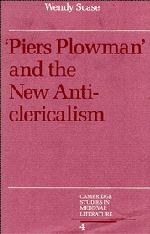Book contents
- Frontmatter
- Contents
- Preface
- Acknowledgements
- Note on quotations and references
- List of abbreviations
- 1 Introduction: tradition and the new anticlericalism
- 2 The usurpation of priestly power and the transformation of an antifraternal satire
- 3 Poverty: an old controversy and a new polemic
- 4 Charity: the ground of anticlericalism
- 5 Antireligious traditions and a new satire in the C-text
- 6 Clerical dominion and authority in new anticlerical literature
- Notes
- Bibliography
- General index
- Index of Piers Plowman citations
Preface
Published online by Cambridge University Press: 09 February 2010
- Frontmatter
- Contents
- Preface
- Acknowledgements
- Note on quotations and references
- List of abbreviations
- 1 Introduction: tradition and the new anticlericalism
- 2 The usurpation of priestly power and the transformation of an antifraternal satire
- 3 Poverty: an old controversy and a new polemic
- 4 Charity: the ground of anticlericalism
- 5 Antireligious traditions and a new satire in the C-text
- 6 Clerical dominion and authority in new anticlerical literature
- Notes
- Bibliography
- General index
- Index of Piers Plowman citations
Summary
This book is a study of the anticlericalism of Piers Plowman. The approach is historical and contextual. As a basis for my account, I have studied anticlericalism contemporary with the poem, exploring the many sides of that opposition to the clergy: its satire, polemic, theory, language and politics. I have studied the defences and apologies put forward by the clerics, and the traditions drawn upon by both sides. In the pages which follow, I argue that we have in this period a transformation of tradition: a ‘new anticlericalism’. I have charted the emergence of the new anticlericalism in the bouts of the conflict with the clerics. This book is about the part played by Piers Plowman in that drama.
The perspective and treatment of the subject here are very different from those of previous studies in the field. Previous work on the opposition to the clergy in this period has considered attacks on clerics of different kinds as examples of disparate anticlerical ‘traditions’, for example, as traditional antifraternalism, or antimonasticism, or antipapalism. Later fourteenth-century examples of satire and polemic have been considered in relation to earlier writings, as continuations of traditions found there. Writings from the later period of anticlericalism have not been considered in their contemporary context; most importantly, they have not been considered in relation to one another. Thus it has been thought that the various anticlerical traditions of the past continued, unchanged, in what I have called the Piers Plowman period (the period during which the poem was composed), and in Piers Plowman.
- Type
- Chapter
- Information
- Piers Plowman and the New Anticlericalism , pp. ix - xiiPublisher: Cambridge University PressPrint publication year: 1989

